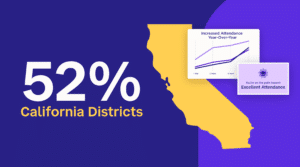
Featured Resource
Why Over Half of California School Districts Trust SchoolStatus
Read More >Join Mission: Attendance to reduce chronic absenteeism in 2025-26! >> Learn How <<






Take a moment to learn five research-backed characteristics of successful coaching programs, how to create your own digital coaching card, tips for building relationships with all district-level employees, and more. Enjoy!
Ready to join over 3,000 of your coaching peers who receive fresh coaching content every Wednesday? Subscribe to our Weekly Coaching Roundup below.
{{cta(‘1623fdae-2dee-4cee-a003-34270e4a47e4′,’justifycenter’)}}
Stephanie Affinito teaches us how to create and use digital coaching cards to boost connections as an IC.
“Digital coaching cards represent who we are in the online space.
They quickly showcase our accomplishments, our professional interests, and how others can reach us. And they’re not just for businesses anymore! They’re for anyone creating a digital footprint online, including instructional coaches.”
Jennifer Ivory reflects on how she developed a questioning and listening checklist to support her coaching conversations after realizing she wasn’t consistently hitting the mark.
“Being a ‘doer’ means that I like to have a finished product at the end of any task, which is exactly what my checklist gives me.
It allows me to have a quick and easy method of completing a reflection and supports my learning journey through the Coaching Institute. By using the checklist,
I can compare checks and notes after four or five conversations to see if I have shown any growth.”
Katie Ritter highlights five researched-backed characteristics of successful coaching programs.
“Instructional coaching of teachers has become a promising form of high quality professional development over the past few decades. Yet, after nearly 40 years of schools investing in instructional coaching,
the role still varies drastically in everything from title of the position, to job responsibilities, and to coaching models in which the role is carried out with teachers. So then, how do we know if we have a successful instructional coaching program?”
Vicki Collet encourages ICs to ask more open-ended questions and focus on not dominating conversations with teachers.
“If you catch yourself going off on tangents or repeating yourself during a coaching conversation, rein in your tongue by asking a question and then listening deeply to the teacher’s response. . . .
Questions encourage others to talk, shifting the balance of the conversation so that teacher talk takes precedence. Asking questions prevents you from dominating a dialogue.”
Jeffrey Bradbury covers five groups of district-level employees ICs must work with and the relationship from both parties’ perspectives.
”
One of the key skills that a Coach will need to develop as they and the position evolve in the school district is the ability to work with and within each of the levels of a school district. . . . Having strong relationships at both the central and district level administrative levels allows the coach to speak not only to, but for the district as they are usually the ones who are tasked with implementing new initiatives and programs.”
Steve Barkley believes ICs should ask teachers what role they want them to play in their coaching conversations and stick to it.
“Trust is built as the coach stays in the role agreed upon in the pre-conference.
Sharing expertise feedback that wasn’t requested is likely to be interpreted by the teacher as evaluation. Equally, a coach withholding helpful knowledge wanting a teacher to ‘figure it out,’ when the teacher desires the information, raises frustration.”
{{cta(’34b13594-505a-497a-8a75-16ae35acf14d’)}}
Have some interesting instructional coaching news?
Share it with TeachBoost and we’ll highlight it here!
 SchoolStatusSchoolStatus gives educators the clarity and tools they need to get students to class and keep them moving ahead. Through our integrated suite of data-driven products, we help districts spot attendance patterns early, reach families in ways that work for them, and support teacher growth with meaningful feedback. Our solutions include automated attendance interventions, multi-channel family communications in 130+ languages, educator development and coaching, streamlined digital workflows, and engaging school websites. Serving over 22 million students across thousands of districts in all 50 states, SchoolStatus helps teachers and staff see what matters, act with speed, and stay focused on students.
SchoolStatusSchoolStatus gives educators the clarity and tools they need to get students to class and keep them moving ahead. Through our integrated suite of data-driven products, we help districts spot attendance patterns early, reach families in ways that work for them, and support teacher growth with meaningful feedback. Our solutions include automated attendance interventions, multi-channel family communications in 130+ languages, educator development and coaching, streamlined digital workflows, and engaging school websites. Serving over 22 million students across thousands of districts in all 50 states, SchoolStatus helps teachers and staff see what matters, act with speed, and stay focused on students.
News, articles, and tips for meeting your district’s goals—delivered to your inbox.






